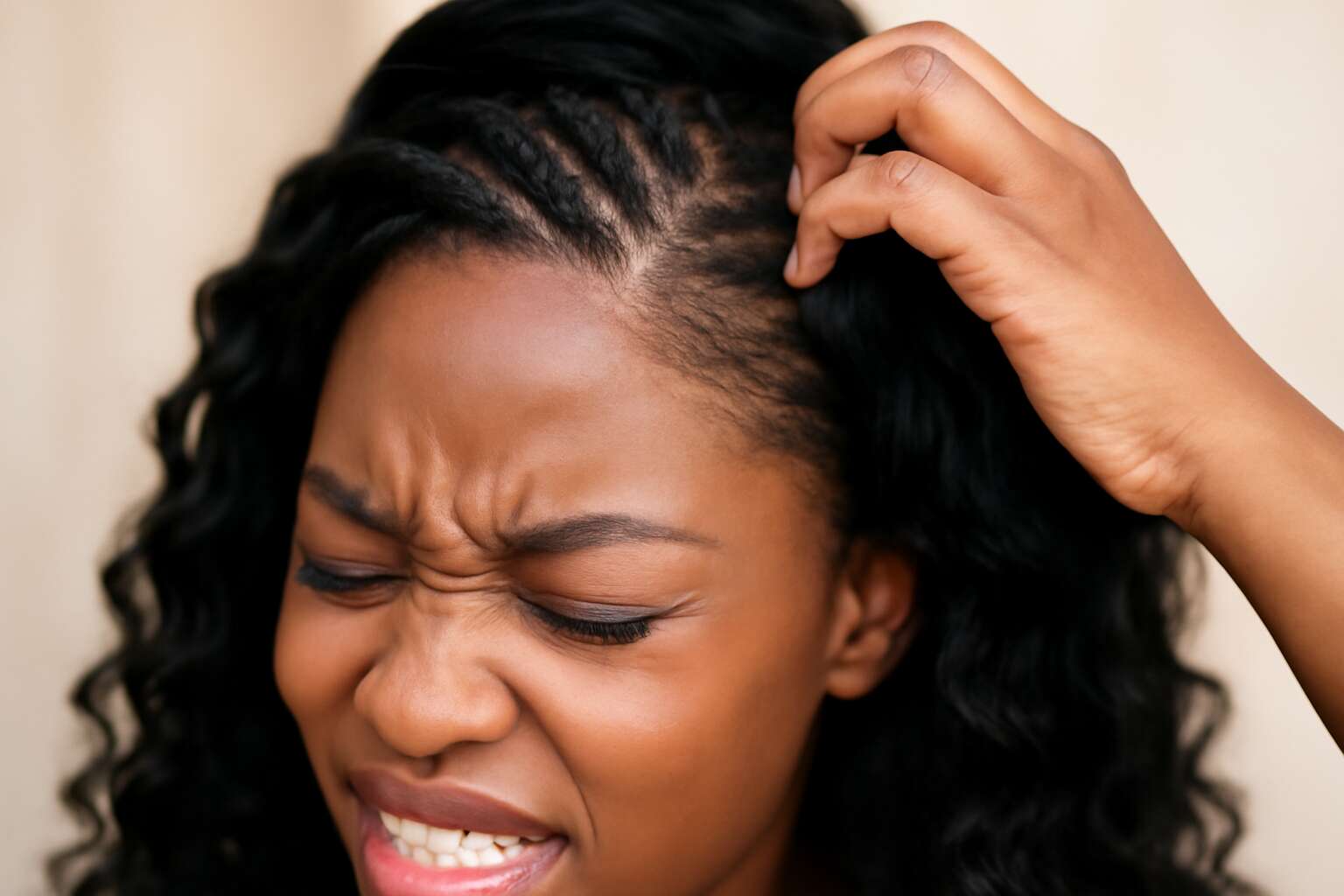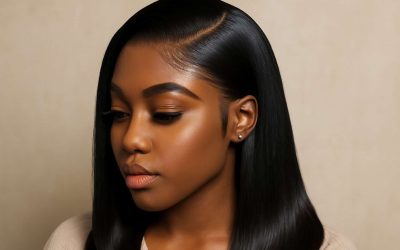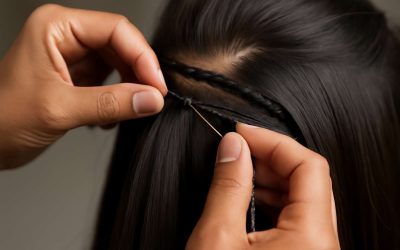Understanding Weaves and Their Popularity
Types of hair weaves – Different kinds of hair weaves (synthetic, human hair, crochet, sew-in)
Weaves have become a staple in the beauty routines of many, offering a quick transformation and a sense of empowerment. Their popularity stems from their versatility and the ability to switch styles effortlessly. But amid the glamour, many wonder: why do weaves itch? The answer lies in the complex interplay between scalp sensitivity, product buildup, and the type of weave used. Understanding these factors can help mitigate discomfort and enhance your experience.
There are several types of hair weaves, each with unique characteristics that influence how they feel and respond on the scalp. Synthetic weaves, for instance, are affordable and low-maintenance but often cause more irritation because of their chemical composition. Human hair weaves provide a more natural feel, yet they can still cause itching if not properly cared for. Crochet weaves and sew-in styles are popular options for their longevity, but their installation process can sometimes lead to scalp irritation or allergic reactions. Recognizing the differences between these types is crucial in answering the question of why do weaves itch and how to prevent it.
Reasons for choosing hair weaves – Fashion, convenience, protective styling
In a world where beauty is both an art and a statement, hair weaves have become more than just a trend—they are a symbol of self-expression and transformation. Their allure lies in the promise of instant glamour, offering an effortless way to reinvent oneself. From bustling city streets in Johannesburg to the vibrant corners of Cape Town, the appeal of hair weaves resonates deeply across South Africa, captivating women seeking versatility and elegance.
Yet, amid this allure, a question persists—why do weaves itch? The answer is woven into the delicate dance between scalp sensitivity, product buildup, and the intricate craftsmanship that goes into each weave. Understanding why do weaves itch helps us appreciate the artistry of styling, while also revealing the hidden discomforts that can sometimes accompany beauty’s pursuit. Whether for fashion, convenience, or protective styling, the desire to look and feel radiant remains universal, even as we navigate the occasional itch beneath the glamour.
Common Causes of Itching in Weaves
Allergic reactions – Sensitivities to dyes, adhesives, or synthetic fibers
Many women in South Africa have marveled at the allure of a flawless weave, yet often find themselves frustrated by an unanticipated itchiness that seems to appear out of nowhere. In fact, over 60% of weave wearers report experiencing discomfort or itching at some point, leading many to wonder: why do weaves itch? The answer often lies in allergic reactions, a hidden curse woven into the fabric of synthetic and even some human hair extensions.
Allergic reactions are a common cause of why do weaves itch. These sensitivities can stem from dyes used to color the hair, adhesives applied during installation, or synthetic fibers that do not breathe comfortably against the scalp. When the scalp perceives these foreign substances as threats, it reacts defensively—causing itching, redness, or even inflammation. Sometimes, this reaction is so mild that it’s barely noticeable, but in other cases, it can become a persistent, maddening sensation that ruins the beauty of the weave.
To better understand, consider the following:
- Some adhesives contain latex or formaldehyde, which are notorious for triggering allergic responses.
- Synthetic fibers often lack the natural oils found in human hair, leading to scalp dryness and irritation.
- Harsh dyes or chemical treatments can sensitize the scalp, making it more susceptible to itching and discomfort.
Understanding these causes is crucial for anyone seeking to enjoy a stunning weave without the nuisance of incessant itching. Recognizing that allergic sensitivities are often at play illuminates the importance of choosing high-quality, hypoallergenic products—helping you reclaim comfort and confidence in your style.
Poor scalp hygiene – Build-up of sweat, oil, and product residues
Among the myriad reasons why do weaves itch, poor scalp hygiene is often an overlooked culprit. When sweat, oil, and product residues accumulate beneath the weave, they create an environment ripe for irritation. This buildup can clog hair follicles and trap dirt, turning the scalp into a breeding ground for discomfort and itching. The sensation can start as a faint prickling, gradually intensifying into an insistent, maddening itch that distracts from your stunning look.
Leaving scalp care to chance only exacerbates the problem. The longer residues linger, the more the scalp becomes inflamed and sensitive. To prevent this, maintaining a routine of gentle cleansing is essential. When the scalp is free of grime and excess oils, it breathes easier, reducing the likelihood of irritation that fuels the question—why do weaves itch? Recognizing the importance of scalp hygiene is key to enjoying your weave without the persistent itch that can turn style into discomfort.
Tight installation – Traction alopecia and scalp tension
Tight installation of a weave can be both tempting and problematic. When a weave is too snug, it exerts excessive traction on the scalp, leading to discomfort and, more seriously, traction alopecia. This condition, often misunderstood, results from persistent tension that weakens hair follicles over time, causing hair loss and scalp sensitivity. Many women in South Africa experience this firsthand, especially when styles are done hastily or by untrained hands.
Scalp tension from tight weaves doesn’t just cause hair breakage; it also stirs irritation and inflammation. The constant pulling stretches the delicate skin, making it more prone to itchiness—an answer to the question of why do weaves itch sometimes. To avoid this, it’s crucial to opt for a comfortable, well-fitting style that won’t drag on the scalp. Remember, the beauty of a weave lies not just in the look but also in maintaining scalp health and comfort.
Inadequate preparation – Not cleansing or conditioning the scalp before install
Many women in South Africa have experienced that uneasy sensation of itching after getting a hair weave—it’s almost as if the scalp is calling out for relief. One common culprit is inadequate preparation before installation. When the scalp isn’t properly cleansed and conditioned, it’s like leaving a battlefield of dirt, oils, and product residues that can ignite irritation beneath the weave. This buildup creates a hostile environment where bacteria and fungi can thrive, intensifying the itchiness that leaves you constantly scratching.
In some cases, the irritation stems from neglecting to treat the scalp with gentle, nourishing products before the installation. A clean, healthy scalp provides a better foundation, reducing the chances of discomfort and itching. When the scalp is unprepared, the weave’s weight and tension only exacerbate the problem, making it clear that proper pre-installation care is crucial in understanding why do weaves itch. After all, a happy scalp is the secret to enjoying your beautiful style without the constant urge to scratch!
Skin Conditions That Contribute to Weave Itching
Contact dermatitis – Reaction to products used on the scalp or weave
In the grand tapestry of beauty and self-expression, hair weaves often serve as a crown of confidence for many South Africans. Yet, beneath this glamorous veneer, a common question persists: why do weaves itch? One insidious cause is contact dermatitis—a skin condition that transforms a moment of allure into discomfort. When the scalp reacts to certain products used during installation, such as adhesives, dyes, or synthetic fibers, inflammation ensues. These reactions can be exacerbated by sensitivities to specific ingredients, leading to persistent itching and sometimes even painful rashes.
Understanding why do weaves itch due to contact dermatitis is crucial. It highlights the importance of choosing gentle, hypoallergenic products and ensuring proper scalp hygiene. Sometimes, the irritation stems from an allergic response to adhesives or synthetic fibers, which can cause the immune system to overreact. Recognizing these signs early can save you from prolonged discomfort, making your weave experience not only beautiful but also safe and nourishing for your skin.
Seborrheic dermatitis – Dandruff-like scalp condition causing irritation
Behind the shimmering allure of a well-crafted weave lies a complex interplay of scalp health and individual sensitivities. Sometimes, the reason why do weaves itch isn’t just superficial—it can be rooted deep within the skin’s response to underlying conditions. One such condition that often goes unnoticed is seborrheic dermatitis, a common yet misunderstood scalp disorder that mimics dandruff but carries its own unique irritations.
Seborrheic dermatitis produces flaky, greasy patches that cling stubbornly to the scalp, provoking relentless itching. The inflammation triggers a cycle of discomfort, making the scalp hypersensitive to the presence of synthetic fibers, adhesives, or even residual oils and dirt. This persistent irritation can turn an otherwise beautiful weave into a source of ongoing frustration. To truly understand why do weaves itch, recognizing the signs of such skin conditions is vital—because they can silently undermine the confidence a weave is meant to boost.
Psoriasis – Chronic skin condition leading to itchy patches
While many assume that scalp discomfort from weaves is simply a case of dry skin or minor irritation, deeper skin conditions can play a significant role in why do weaves itch. One such culprit is psoriasis—a chronic autoimmune disorder that manifests as red, scaly patches on the scalp. These patches are often intensely itchy, causing discomfort not just from the visible flare-ups but also from the relentless urge to scratch. When a weave is installed over a scalp affected by psoriasis, the irritation can escalate quickly, leading to further inflammation and even more intense itching.
Psoriasis doesn’t just cause physical discomfort; it can also affect the emotional well-being of those wearing hair weaves. The persistent itchiness and visible patches may make individuals hesitant to wear their style confidently. Recognising the signs—such as thickened skin, silvery scales, and persistent redness—is crucial. The underlying inflammation associated with psoriasis makes the scalp hypersensitive, which explains why do weaves itch even more when an underlying skin condition is present. Addressing this condition is essential for a comfortable and healthy weave experience.
Impact of Improper Maintenance and Wear Practices
Infrequent washing – Accumulation of dirt and oils
When maintenance practices falter and wear habits become careless, the consequences can be surprisingly discomforting—particularly in the form of persistent itching. Infrequent washing allows dirt, oils, and product residues to accumulate on the scalp and within the weave, creating an environment ripe for irritation. Over time, this buildup can lead to an itchy scalp that seems impossible to soothe. Many individuals overlook the importance of regular cleansing, assuming that the weave itself is to blame for why do weaves itch, but often the culprit is neglecting proper hygiene.
This neglect not only causes discomfort but also fosters bacterial and fungal growth, which exacerbates scalp sensitivity. A neglected weave traps moisture and dirt, disturbing the delicate balance of the scalp’s natural flora. This imbalance can trigger inflammatory responses, leading to an itchy, uncomfortable scalp. Proper maintenance, including gentle washing with suitable products, is essential to prevent these issues. When weaves are left unwashed for extended periods, the irritation transforms from minor annoyance to persistent discomfort, reminding us that good hygiene is the foundation of a healthy, itch-free experience.
Incorrect product use – Use of harsh chemicals or unsuitable products
Improper maintenance and wear practices can turn a beautiful weave into a source of constant discomfort. When products aren’t used correctly, scalp irritation becomes almost inevitable. Harsh chemicals, incorrect styling products, or incompatible conditioners can strip the scalp’s natural oils, leading to dryness and itching. Many individuals wonder why do weaves itch, and often, the answer lies in neglecting proper product application.
Using unsuitable products can also cause build-up and allergic reactions. For instance, some synthetic fibers react badly to strong dyes or adhesives, triggering inflammation and persistent itching. To avoid this, always choose gentle, sulfate-free shampoos and avoid overloading the scalp with heavy styling products. Remember, less is often more when it comes to maintaining a healthy scalp beneath your weave.
- Applying harsh chemicals that irritate the scalp
- Using incompatible products that cause build-up
- Failing to remove residue thoroughly during washes
These missteps not only make the scalp sensitive but also create a breeding ground for bacterial or fungal growth, which worsens the itching. Proper product use and maintenance are essential to keep your scalp calm and comfortable. When weaves are cared for correctly, the itchiness that puzzles many becomes a thing of the past.
Tight or prolonged wear – Causing scalp stress and irritation
Wearing a weave can transform your look instantly, but many women find themselves scratching their scalp in frustration. One common culprit behind this discomfort is improper maintenance and wear practices. When weaves are kept in for too long or installed too tightly, the scalp becomes stressed and irritated. The tension from tight or prolonged wear restricts blood flow and causes traction alopecia, which often leads to persistent itching. It’s no wonder that many ask, “why do weaves itch?”
Over time, neglecting proper scalp hygiene exacerbates the problem. Failing to remove residue thoroughly during washes allows sweat, oil, and product build-up to accumulate. This creates an environment ripe for bacterial and fungal growth, intensifying itchiness. To keep discomfort at bay, it’s essential to balance the wear duration and ensure gentle, thorough cleansing. Remember, less tension and more care can make all the difference in preventing that relentless itch that so many associate with weave wear.
Preventive Measures and Tips for Comfort
Choosing the right weave – Selecting hypoallergenic and breathable hair types
Understanding why do weaves itch is essential for anyone seeking comfort and longevity in their protective styling. The sensation of itchiness often emerges from the scalp’s natural response to foreign materials, but it can also signal underlying sensitivities or improper installation. When choosing a weave, prioritizing hypoallergenic and breathable hair types can dramatically reduce discomfort, allowing for a more enjoyable experience. Natural human hair, for example, tends to be less irritating than synthetic fibers, which can trap heat and moisture, fostering irritation.
Preventive measures are vital in mitigating the itchiness associated with weaves. Regular scalp hygiene, including gentle cleansing and conditioning, helps prevent buildup of oils and product residues that exacerbate irritation. Additionally, selecting breathable hair types—such as those made from high-quality human hair—ensures proper air circulation, decreasing the likelihood of itchiness. For added comfort, opting for a looser installation or ensuring the weave isn’t too tight can significantly reduce tension on the scalp, which is often the root cause of why do weaves itch.
Proper installation – Ensuring correct, gentle installation methods
Understanding why do weaves itch involves unraveling the delicate balance between comfort and style. Proper installation plays a pivotal role in preventing unnecessary scalp irritation. When a weave is installed correctly, it minimizes tension and reduces the risk of scalp stress, which is often the culprit behind why do weaves itch. Ensuring a gentle, skillful application can transform a potentially uncomfortable experience into one of effortless elegance.
One of the most effective preventive measures is to opt for breathable hair types and maintain meticulous scalp hygiene. Regular cleansing with gentle, sulfate-free shampoos and conditioning helps keep buildup of oils, sweat, and product residues at bay—factors that can exacerbate why do weaves itch. When the scalp remains clean and well-moisturized, the likelihood of irritation diminishes significantly.
For added comfort, consider the installation method. Looser weaves and avoiding excessive tension not only promote scalp health but also extend the longevity of the style. Remember, a well-installed weave isn’t just about appearance—it’s about respecting your scalp’s natural harmony, ensuring that the answer to why do weaves itch doesn’t turn into a persistent annoyance. Ultimately, gentle handling and thoughtful choices can make all the difference in turning a style into a source of pride rather than discomfort!
Regular scalp care – Washing, moisturizing, and exfoliating your scalp
Understanding why do weaves itch often begins with good scalp hygiene. Regular scalp care is essential in preventing discomfort and irritation. Washing your scalp with gentle, sulfate-free shampoos removes the buildup of oils, sweat, and product residues that can cause itching. Moisturizing keeps the scalp hydrated, reducing dryness and flakiness that contribute to the sensation of itchiness. Exfoliating the scalp gently helps in removing dead skin cells, which can clog hair follicles and intensify the itching.
For added comfort, consider incorporating a routine that balances cleanliness with relaxation. An easy way to do this is by using natural oils such as tea tree or peppermint, which have soothing and antimicrobial properties. Remember, a well-maintained scalp is less likely to be sensitive or inflamed, making it easier to enjoy your style without the persistent question of why do weaves itch. Consistency in scalp care transforms an itchy weave into a source of pride and comfort, allowing you to embrace your beauty with confidence and ease!
Professional assistance – Getting professional help for adjustments and maintenance
In the realm of radiant tresses, a common lament echoes—”why do weaves itch?” Itching can transform a glamorous crown into a source of discomfort, overshadowing the confidence that hair extensions promise. One often overlooked safeguard against this annoyance is seeking the expertise of a professional. Skilled stylists possess the nuanced understanding necessary to ensure your weave is installed with care, minimizing tension and undue stress on your scalp. Their knowledge of proper techniques—like gentle braiding and correct adhesive application—can significantly reduce the risk of irritation and itching.
Moreover, maintaining ongoing professional adjustments can prevent the buildup of debris and tension that exacerbate itching. An expert can identify early signs of scalp distress, offering tailored solutions that soothe rather than irritate. If persistent discomfort persists, a consultation with a trichologist or dermatologist becomes essential—these specialists can diagnose underlying conditions such as seborrheic dermatitis or psoriasis, which often amplify why do weaves itch so fiercely. Remember, entrusting your scalp to seasoned hands transforms the ordeal of an itchy weave into a seamless celebration of beauty and wellness.
When to Seek Medical Advice
Persistent itching – When discomfort lasts beyond a reasonable period
In the shadowy realm of beauty and self-expression, the question lingers: why do weaves itch? For many, this sensation transforms from a mere nuisance into a persistent torment. When the discomfort stretches beyond the expected adjustment period, it’s a siren warning that something darker may be at play. Chronic itching can be a sign of underlying issues that demand professional intervention.
If the itching persists for more than a few days, or if you notice other symptoms like redness, swelling, or pain, it’s time to seek medical advice. These warning signs could indicate contact dermatitis, scalp infections, or an allergic reaction to dyes or adhesives used in the weave. Ignoring these signals might exacerbate the problem, leading to more severe conditions such as scalp infections or hair loss.
Encountering such persistent discomfort warrants a consultation with a dermatologist or trichologist. They can diagnose the root cause—be it an allergic sensitivity or an underlying skin condition—and recommend appropriate treatment. Never underestimate the importance of addressing why do weaves itch; your scalp’s health depends on it, after all. Remember, sometimes the itch is just the surface, but often it’s a call for deeper healing.
Signs of infection – Redness, swelling, pus, or sores
Persistent itching after getting a hair weave can be more than just an annoyance; it might be a warning sign of a developing scalp infection. Recognizing the signs early can prevent more serious complications down the line. If you notice redness, swelling, or pus forming around your scalp, it’s time to pay close attention.
Infections often manifest through visible symptoms such as sores or areas that feel tender and warm to the touch. These signs indicate that bacteria or fungi may have taken hold beneath the weave, creating an environment ripe for discomfort. If left untreated, these infections could lead to hair loss or long-term scalp damage.
- Redness
- Swelling
- Pus or sores
When symptoms escalate or persist despite proper hygiene, seeking medical advice becomes essential. A dermatologist or trichologist can diagnose the root cause of why do weaves itch and recommend targeted treatments. Do not ignore these warning signs—they are your scalp’s way of signaling that it needs professional intervention to restore health and balance.
Severe scalp conditions – Diagnosing and treating underlying skin issues
When scalp discomfort escalates beyond mild irritation, it’s crucial to seek medical advice promptly. Severe scalp conditions such as persistent redness, swelling, or pus often signal underlying skin issues that require professional diagnosis and treatment. If you notice these symptoms, it’s a clear sign that your scalp is battling more than just surface-level irritation. Left unattended, these conditions can lead to long-term damage, including hair loss or scarring.
Understanding why do weaves itch is essential, especially when itching becomes relentless or is accompanied by pain or sores. These symptoms may indicate contact dermatitis, seborrheic dermatitis, or even psoriasis—conditions that demand targeted intervention from a dermatologist or trichologist.
In cases where scalp symptoms worsen or do not improve despite proper hygiene, seeking expert help is vital. Only a healthcare professional can accurately diagnose the root cause and recommend suitable treatments to restore your scalp’s health. Ignoring these warning signs could prolong discomfort and complicate recovery, so don’t hesitate to consult a specialist when necessary.




0 Comments